I could have seen a different version of me getting weighed down by the somewhat depressing narrative and the amount of time we spend with some of the characters when they're completely inebriated, but overall it really touched me and I was greatly impressed by the performances in this.
My 2024 Watchlist Obsession!
→ in Movie Reviews

LA GUAGUA AÉREA (1993)
"A Flight of Hope"
Directed by : Luis Molina Casanova
I landed in the rare cinematic landscape of Puerto Rico when I took on La guagua aérea, a film that wants to tell you about where it comes from and does so by taking a microcosm of Puerto Rican society and putting it on a flight from there to New York on one specific night : 20th December 1960. It's narrated by someone thinking back, and I never quite got which character that was - but I'm perfectly willing to concede it doesn't matter all that much. The American air hostesses are at times baffled, and at others terrified, by the behaviour of the various passengers who don't take anything they say very seriously (and anyway, rather unhelpfully, all instructions are in English.) As the flight progresses, a community atmosphere is fostered and before long there's a band striking up music and passengers are dancing in the aisles. At another stage, live crabs escape from one passenger's bag. These guys simply aren't quite cultured enough to have a good sense of flight etiquette, and it's only the two most educated passengers who shrink in embarrassment at their fellow countrymen - not that there's anything really bad about them.
So, this was really interesting in that I've never, ever seen a Puerto Rican film. Unfortunately there don't seem to be any good transfers of La guagua aérea around - but I was lucky that one generous someone has provided an English translation for those interested in seeing it. Various characters have their specific story - a favourite of mine being the "blind" man who is travelling with his padre and has the benefit of some considerable donations which he feels especially guilty about. I wonder why. There's the lady of the night who is looked down upon in her community by all the prudes and others who consider themselves superior. Mostly though, it's men and women looking for a chance to make some money, as there seems to be little opportunity at home. It's a short hop over the ocean, and in the middle of the night all of these specific people have booked the cheapest flight possible - they may not be rich or cultured, but there's a richness to all of them because they're spending a final few moments with people who won't discriminate against them, or treat them poorly.
The comedy in La guagua aérea didn't quite line up with what I find funny, and visually this was a headache to watch, but as a whole I thought this was an excellent film because the overall narrative and screenplay works at bringing out the deeper undercurrents at work here. The sense of community on the plane, and the love people have for one another when they're heading into a place where they'll be treated as inferior is stronger - even when nobody knows each other. On the plane bonds form quickly because of this. The story was strong enough to have itself carry over into a musical version that looks to be popular, and I'm happy to see that. I even wondered about how some of the characters went after they walked off into the chilly New York air - if they made that money to help their family back home, or if their trip to see relatives went well. How the Casanova of the flight fared with who he ended up not getting slapped by. This was short, and looks to have been a fairly inexpensive production (a toy plane had to do for those inserts) - I thought it was good enough as a little culture bubble to be exposed to briefly.
Glad to catch this one - I do not know much about it as information is limited and it seems to have had little exposure outside of Puerto Rico.
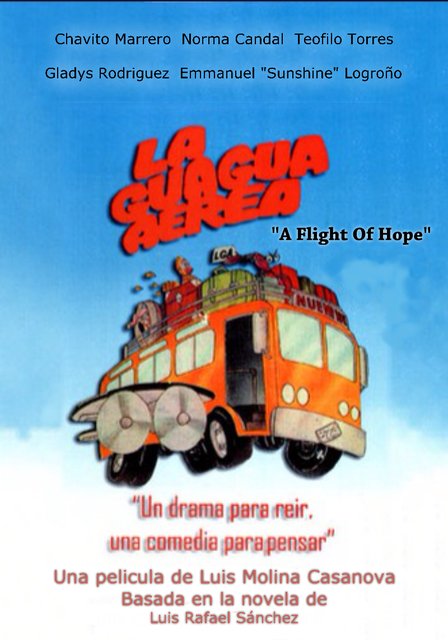
Watchlist Count : 432 (-18)
Next : Miracle in Milan (1951)
Next : Miracle in Milan (1951)
Thank you very much to whomever inspired me to watch La guagua aérea.
__________________
Remember - everything has an ending except hope, and sausages - they have two.
We miss you Takoma
We miss you Takoma
Latest Review : There Will Be Blood (2007)
X
Favorite Movies
X
User Lists
Maybe I need to rewatch it, but I didn’t care much for the acting.
It would be on my shortlist of best acted movies of all time. Fittingly, right along side another boxing movie: Rocky. And then you can also probably throw Raging Bull onto that list. Something about boxing and acting (just not ****ing Million Dollar Baby)
I sometimes wonder how much my personal proximity to the kind of people who populate movies like Fat City, basically marginalized broken weirdos, gives me a bit of an edge on recognizing when a film nails these kinds of sadly beautiful but still very sad worlds. Fat City is the real deal. That is what the kind of life looks and feels and smells like. And Susan Tyrell should have a statue of her erected right in the centre of every dive bar all across the united states of america.
X
Favorite Movies
X
User Lists
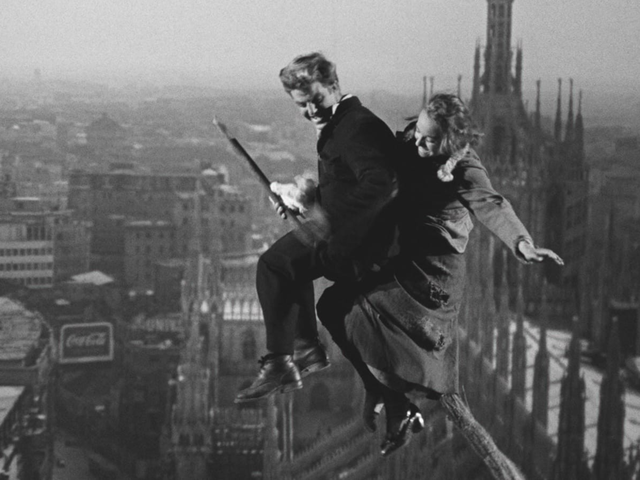
MIRACLE IN MILAN (1951)
Directed by : Vittorio De Sica
Neo realism didn't just have to be about guys getting their bikes pinched and Nazis behaving badly - in Miracle in Milan we have the "neorealist fable" which builds a fairy tale around a group of destitute shantytown inhabitants who, upon oil being discovered under their rickety town, are about to be thrown off this revered little patch of paradise. You could call my use of the word "paradise" sarcasm, but these men and women really do love this home they've literally built for themselves out of a random assortment of discarded building materials. They even have their own national anthem of sorts - which you'll hear numerous times during Miracle in Milan. The central figure amongst all this is Totò (Francesco Golisano). Totò was discovered in a cabbage patch as a baby by the old lady Lolotta (Emma Gramatica) and raised as her own. In a wrenching piece of neorealist sadness, we see Lolotta die when Totò is only a little boy - a whole scene dedicated to him being the lone little mourner following behind her coffin. He grows up to be a kind, thoughtful, but somewhat simple-minded man who nevertheless has the organisational skills to bring the homeless together to build the shantytown they all start regarding as their precious home.
A transformation takes over the film once the landowner, Mobbi (Guglielmo Barnabò) decides to enlist an army of policemen to eject the poor squatters from his land. At this point Totò receives a magical dove from his grandmother who has descended from heaven - a dove which has the power to grant any wish Totò might have. All I could do from this point on was laugh - not only because the film actually becomes quite funny, but because I never ever expected a film considered to be "neorealist" to become so bonkers. Thinking about it, I realised that this whole scenario is pretty close to something I might occasionally dream about. A moment of wish-fulfillment. Anyway - all bets are off and the film simply embraces fantasy to the fullest extent it can. There's a surrealism to this that seems to anticipate the future works of Federico Fellini, and I was just supposing to myself that neorealism was breaking free and transforming itself into something very different. It even required special effects from American specialist Ned Mann. There's also a love story, with Brunella Bovo playing the awkward (but quite stunningly beautiful) love interest who becomes Totò's sweetheart.
"It is true that my people have already attained happiness after their own fashion; precisely because they are destitute, these people still feel - as the majority of ordinary men perhaps no longer do - the living warmth of a ray of winter sunshine, the simple poetry of the wind. They greet water with the same pure joy as Saint Francis did." Vittorio De Sica wrote that and it succinctly explains the whole ethos of Miracle in Milan - it's what the song the poor sing alludes to as well. De Sica, in neorealist style, had genuinely poor and destitute people play the parts of themselves in this movie - so it really is a slice of cold hard reality existing within a fantasy framework, which is very unusual. It's far more uplifting than the other Vittorio De Sica films I've seen - almost defiant. The poor are more in touch with nature and life than the rich, who hunker down inside palaces without getting their hands dirty. There's misery, of course, but there's also such a strong sense of community in this film, and it's true that these people take great pleasure in the little things. In the end, Miracle in Milan is a spectacle which is fun to watch, touching, funny, heartwarming, stirring and very different. Probably a must-see. I'm glad I saw it.
Glad to catch this one - 1951 Cannes Film Festival Grand Prize Winner and BAFTA Best Film Winner.

Watchlist Count : 431 (-19)
Next : Oslo, August 31st (2011)
Next : Oslo, August 31st (2011)
Thank you very much to whomever inspired me to watch Miracle in Milan.
X
Favorite Movies
X
User Lists
It's far from the most racist film ever made by a long shot, but it has what's probably the most cringe inducing blackface scene I've ever seen in film. Especially considering the build up to it.
Aside from that, I really enjoyed it.
Aside from that, I really enjoyed it.
X
Favorite Movies
X
User Lists
It's far from the most racist film ever made by a long shot, but it has what's probably the most cringe inducing blackface scene I've ever seen in film. Especially considering the build up to it.
Aside from that, I really enjoyed it.
Aside from that, I really enjoyed it.
X
Favorite Movies
X
User Lists
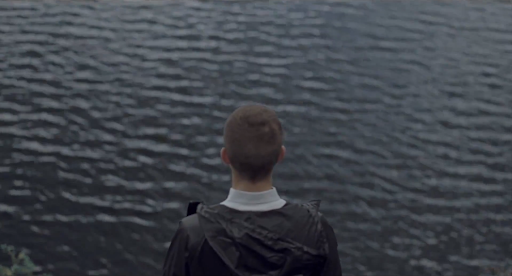
OSLO, AUGUST 31ST (2011)
Directed by : Joachim Trier
Silence pervades the air following this film, and it's a silence I find hard to break - even just by putting my thoughts down by typing them. Joachim Trier presents us with a complex protagonist - Anders (Anders Danielsen Lie) is simple enough if you define him as a drug addict, which you can most assuredly do, but drug addiction is often a symptom in itself. What drove Anders? We meet him at the 10-week mark of his rehabilitation, a severely depressed young man with regrets and no direction in life. On 30th August Anders has a day's leave from the rehab clinic, and he'll spend this day reconnecting with people from his past, and going for a job interview. By watching him do both we learn more about his character, his past history, and the frustrations of a man who, at the age of 34, can't stand the thought of having to start his entire life over again from nothing. His parents are selling the family home to pay for his rehab, and his sister doesn't want to see him. The conversations he has with his friends, and his job interview, do little to alter the course he seems inextricably on.
Props to Anders Danielsen Lie in this film - it's definitely a performance you could call a tour de force, and I'm happy to have spent more time with him after seeing The Worst Person in the World and Sick of Myself. An actor on the rise, who also happens to be a musician and medical doctor! Say what? Yes, Anders Danielsen Lie actually practices as a GP between film roles, which is mind blowing if you ask me. Next up I guess he's going to win a Pulitzer, make a great scientific discovery and become the President of Norway. Anyway, as far as depression goes, this captures the mood perfectly - it can actually be quite trying, especially if you really want Anders to find a better outlook for himself. It's not as if he doesn't go looking, but the trouble is that he goes looking in all of the places he's already familiar with - which is understandable, and makes us realise that we're all inextricably tied to our past. Will he find something to cling on to? Can he start something anew, or is he destined to only find what he knows? The answers are never easy, and seeing the opportunities in life you've wasted especially hard.
Joachim Trier hasn't created this study of depression anew - this is an adaptation of Le Feu follet (Will O' the Wisp/The Fire Within), a famous novel by Pierre Drieu La Rochelle about a First World War veteran who falls into despair after leading a decadent life. In both the novel and this film the main character has a desperate need to make some kind of connection with another human being, and it's these moments that define Oslo, August 31st. Anders can never really "connect" with any of the people he comes into contact with, despite him knowing most of them. The job interview scene is especially painful to watch, because it's rich with possibility and we learn that Anders is an extremely intelligent individual. For some, by the time we get to the end of the film they won't like this character all that much - I was conflicted myself - but as a fellow human being he deserves empathy all the same. Joachim Trier and Anders Danielsen Lie present him to us already wounded, and as we learn more about him it's up to us whether we judge him or not. I do think though, that anyone struggling with addiction and depression deserves compassion - and this film reminds us of that beautifully.
Glad to catch this one - premiered at the 2011 Cannes Film Festival. It won the Best Film and Best Cinematography awards at the Stockholm International Film Festival.
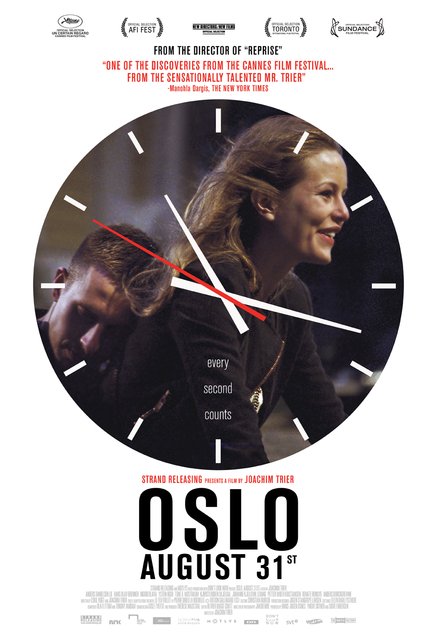
Watchlist Count : 430 (-20)
Next : Smile (1975)
Next : Smile (1975)
Thank you very much to whomever inspired me to watch Oslo, August 31st.
X
Favorite Movies
X
User Lists

SMILE (1975)
Directed by : Michael Ritchie
Beauty pageants can almost satirize themselves, and that's something Michael Ritchie seems to have understood while making Smile, shooting his film around a real pageant held at Veteran's Memorial Auditorium in Santa Rosa, California. Doing so has produced a movie that mostly resembles a Robert Altman film in style and satirical content, although it seems much more rigidly controlled than that director's freewheeling movies. Most people compare this to Nashville, because narrative-wise we end up following so many different characters down their own personal long and winding roads. Head judge, Big Bob (Bruce Dern) might be a used car salesman, but he's surprisingly idealistic when it comes to these pageants, which he's often involved in. The pageant's executive director, Brenda DiCarlo (Barbara Feldon) is all icy efficiency, often being at odds with her husband, Andy (Nicholas Pryor) who is an alcoholic, and worrying about a ritual at the local chapter of the U.S. Junior Chamber where he has to kiss a dead chicken's rear end. In the meantime high school student Little Bob (Eric Shea) is hoping to surreptitiously take pictures of the contestants undressed and sell them to his fellow students. Tommy French (Michael Kidd) is a once-famous choreographer who is now slumming it, teaching the girls dance routines.
I have to admit that I expected that this film would be much more stupid than it ended up being - instead of silly jokes, Smile works hard at being a smart satire with well-defined characters and clever humour. (The way one of the male hosts delivers instructions prohibiting the flushing of sanitary napkins down the toilet had me onboard right away with this film's intentions.) You expect cheap gags from where this film sometimes goes, but instead it surprises you. An insanely young Melanie Griffith is one of the contestants, along with Annette O'Toole, but Dern gets the most screen-time - he's an actor who I'd mostly seen as an old man, until recently seeing him in a whole host of roles pre-Coming Home, including 1964 film Hush...Hush, Sweet Charlotte. I'd rarely seen Barbara Feldon in anything other than the Get Smart series as Agent 99. The performances were great, but this film belongs to screenwriter Jerry Belson, and of course Michael Ritchie - I don't think there was much ad-libbing. The talent segment of the film is absolutely hilarious, but it never gets too carried away with itself - the use of that good old Charlie Chaplin song "Smile" gives it a bittersweet edge, matching the overall tone.
Reading some of the other reviews related to Smile uncovers even more that I didn't quite grasp the first time around - and that may be because it cuts sharply into American culture and sociology in an expansive way, taking this far beyond beauty pageants in general. I think perhaps seeing this through American eyes would have had me noticing more of that. Regardless, when it ended my thoughts were centered on the fact that this was such an incisive, intelligent and savvy movie. It couldn't quite find it's target audience on release, but in the years since it has become a solid cult classic. An exposition of Americana that I had never heard of before, but really should have, and yet another movie I'll probably champion from this moment on. It was crazy how United Artists decided before releasing it that it wouldn't do much business, with Ritchie himself trying to bring attention to a movie that was only released in a handful of theaters with hardly any promotion. It's only now slowly starting to gain the appreciation and audience it deserved, although critics at the time praised it. I thought it an excellent film that I'm already looking forward to seeing again.
Glad to catch this one - the film has an approval rating of 100% based on reviews from 17 critics on Rotten Tomatoes.
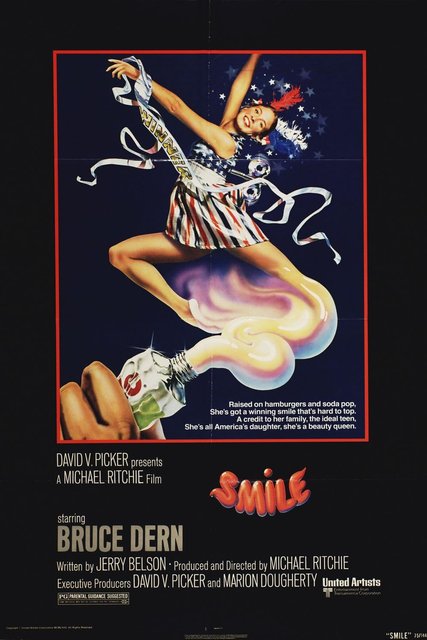
Watchlist Count : 430 (-20)
Next : Great Freedom (2021)
Next : Great Freedom (2021)
Thank you very much to whomever inspired me to watch Smile.
X
Favorite Movies
X
User Lists
A big  for Smile. And it's funny how you mentioned Robert Altman because the film this most reminded me of was Brewster McCloud. That and maybe Cold Turkey for some reason.
for Smile. And it's funny how you mentioned Robert Altman because the film this most reminded me of was Brewster McCloud. That and maybe Cold Turkey for some reason.
 for Smile. And it's funny how you mentioned Robert Altman because the film this most reminded me of was Brewster McCloud. That and maybe Cold Turkey for some reason.
for Smile. And it's funny how you mentioned Robert Altman because the film this most reminded me of was Brewster McCloud. That and maybe Cold Turkey for some reason.
Smile is ridiculously overlooked as is, honestly, Michael Ritchie (Downhill Racer, Fletch, Smile, Prime Cut, The Candidate, Bad News Bears). That's enough quality stuff that it's making me reconsider all those bad reviews I read about his The Island when I was a kid (which I thought had the best movie poster I'd ever seen and, yet, I've still never seen it because of its terrible word of mouth)
X
Favorite Movies
X
User Lists

SMILE (1975)
Directed by : Michael Ritchie
Beauty pageants can almost satirize themselves, and that's something Michael Ritchie seems to have understood while making Smile, shooting his film around a real pageant held at Veteran's Memorial Auditorium in Santa Rosa, California. Doing so has produced a movie that mostly resembles a Robert Altman film in style and satirical content, although it seems much more rigidly controlled than that director's freewheeling movies...
X
Favorite Movies
X
User Lists
It might also be time to track down Ritchie's Semi Tough, since it looks to have been made when he was making mostly great things.
X
Favorite Movies
X
User Lists
Semi Tough was pretty good. I preferred the Dan Jenkins novel (definitely not saying it was better!  ) They changed a lot of it around so they could lampoon the then current New Age and self-help obsession involving EST (Erhard Seminar Training), and Rolfing. They called it Pelfing (Structural Integration) after Lotte Lenya's character Clara Pelf. Bert Convy plays this smarmy guru type pushing his own brand of self-awareness called the B.E.A.T. program. They also throw in something called Movagenics which involved Robert Preston creeping along the floor on his hands and knees.
) They changed a lot of it around so they could lampoon the then current New Age and self-help obsession involving EST (Erhard Seminar Training), and Rolfing. They called it Pelfing (Structural Integration) after Lotte Lenya's character Clara Pelf. Bert Convy plays this smarmy guru type pushing his own brand of self-awareness called the B.E.A.T. program. They also throw in something called Movagenics which involved Robert Preston creeping along the floor on his hands and knees.
It's actually pretty good satire but I don't think the Jenkins novel was the right framework for it.
 ) They changed a lot of it around so they could lampoon the then current New Age and self-help obsession involving EST (Erhard Seminar Training), and Rolfing. They called it Pelfing (Structural Integration) after Lotte Lenya's character Clara Pelf. Bert Convy plays this smarmy guru type pushing his own brand of self-awareness called the B.E.A.T. program. They also throw in something called Movagenics which involved Robert Preston creeping along the floor on his hands and knees.
) They changed a lot of it around so they could lampoon the then current New Age and self-help obsession involving EST (Erhard Seminar Training), and Rolfing. They called it Pelfing (Structural Integration) after Lotte Lenya's character Clara Pelf. Bert Convy plays this smarmy guru type pushing his own brand of self-awareness called the B.E.A.T. program. They also throw in something called Movagenics which involved Robert Preston creeping along the floor on his hands and knees.It's actually pretty good satire but I don't think the Jenkins novel was the right framework for it.
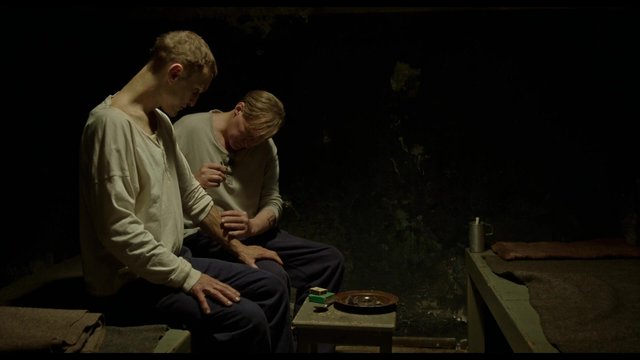
GREAT FREEDOM (2021)
Directed by : Sebastian Meise
When the allies liberated the German concentration camps near the end of the Second World War, not all prisoners were actually freed. Homosexuals, under the notorious Paragraph 175 (made more severe by the Nazis) were shuttled from camp to prison to serve out the remainder of their sentence. Although East Germany reverted to the pre-Nazi version of 175, West Germany kept the provisions the Nazis had introduced until 1969, when some, but not all, provisions were repealed. Paragraph 175 lasted until 1994 before it was repealed completely - it had stood since 1871. Hans Hoffmann (Franz Rogowski) plays one of those concentration camp victims who were taken straight to prison in Great Freedom. From 1945 to 1969, we see his various incarcerations, his lovers inside the prison, and his relationship with long-term inmate Viktor Kohl (Georg Friedrich), who at first reacts violently to having to share a cell with a "pervert". The prison guards are determined to stamp out any chance Hans might have of experiencing love and comfort, even at times of severe emotional distress. All the same, even within the walls of such a prison, it can't be completely extinguished.
Count me as one person who had no idea about Germany's strict anti-gay laws and how they were enthusiastically enforced during most of the 20th Century. The most striking moment in Great Freedom comes from us learning that despite surviving the camps, Hans is still being punished - this even shocks the hardened Viktor. Every time Hans is released after serving his time, he's followed, filmed when he's with other men, and brought back to serve more time. It's interesting to note that his great loves and losses occur behind bars, and that the deepest most sincere bond he ever has in his life is with Viktor, whose bigotry slowly wears away over the course of decades. I was fascinated by Franz Rogowski's performance, I'm a huge fan of Christian Petzold's Transit, and it was illuminating to see how much range the guy has. He's gentle, and it's a gentleness which offsets itself against the brutality of a system where the gentle, kind man is being punished and the brutalizers are the supposed "good guys". Hans never lashes out, although he loses it when thrown into solitary confinement so soon after suffering inside a concentration camp.
In the meantime Viktor is a really nice representation of German society as a whole, having a slowly changing attitude - he starts the film almost ready to kill Hans, but eventually softens that stance when he feels pity. He watches how alone Hans is at first, and then learns that he's a survivor of the camps - something he's awestruck by. That doesn't mean he suddenly loves his cellmate though, and Hans suffers from a lack of tact at times, which provokes Viktor into violence - setting the two back somewhat. Overall, the film is most successful when accessing our emotions, our empathy earned by the sincerity Sebastian Meise teases out of Rogowski - especially his tenderness when he's with a lover. It culminates with a whole series of scenes in the films final act that take us to the limits of our two main character's endurance. The film is also interesting visually with what it does with light and darkness - always potent as symbolism. It tops this all off with a final scene as unexpected as it is meaningful and expressive - everybody watching forced to contemplate it's meaning outside of the scope the film had up until that point. A neat trick to finish off a great film.
Glad to catch this one - won the Jury Prize in the Un Certain Regard section at the 2021 Cannes Film Festival, and was shortlisted for the Best International Feature Film at the 94th Academy Awards.
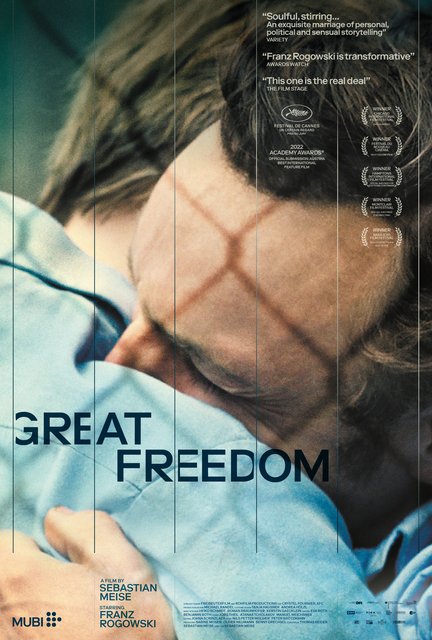
Watchlist Count : 429 (-21)
Next : Two Half-Times in Hell (1961)
Next : Two Half-Times in Hell (1961)
Thank you very much to whomever inspired me to watch Great Freedom.
X
Favorite Movies
X
User Lists
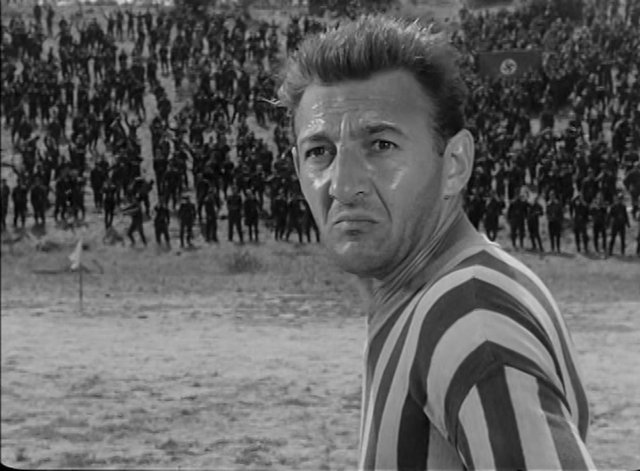
TWO HALF-TIMES IN HELL (1961)
Directed by : Zoltán Fábri
Zoltán Fábri is just as unrelenting in Two Half-times in Hell than he is in The Fifth Seal - there's no search for a silver lining here, and there are situations that the human spirit is powerless to overcome. He leaves us in no doubt - being under the thumb of an autocratic military dictatorship means nothing prospers. To Hungarian political prisoner Ónódi (Imre Sinkovits) football is absolutely sacred, so when he's ordered, in 1944, to organize a team to play the Germans for Hitler's birthday celebrations he takes his task seriously, without thinking of the wider ramifications. He does ask for extra food, and that this team can train instead of doing the work that is slowly killing him and his compatriots - and the Hungarian authorities agree. This soon separates Ónódi from the rest of the camp, who are desperate to share in his newfound ability to feed himself properly and rest - and these divisions disrupt the unity born from shared suffering. Not only that, the selected team have an opportunity to escape, seeing as they only have one guard lazily overseeing their daily training. Colluding with the Germans, taking benefits his suffering comrades won't have and dealing with his recalcitrant team show him that the sacredness of football means absolutely nothing during wartime.
Fábri makes many other inroads topic-wise during the course of the story. Ónódi is told to avoid conscripting any Jewish players if at all possible, but he finds himself stuck with only eight before deciding he'll have to ignore this suggestion. He finds a man called Steiner (Dezső Garas), a relentlessly bullied Jewish prisoner working in the rock quarry who says he plays left field - but when training starts Ónódi finds out this man lied to him, and can't play at all. Turns out Steiner was on the verge of dying, and Ónódi has to choose whether or not to report him, which would mean his sure death after all. It begs the question, which is raised often - Ónódi has the chance to save prisoners on the verge of death, but how many can he save and yet still put together a team viable enough to entertain the Germans? What happens when a guard demands most of their extra food as a bribe to save another well-respected prisoner from execution? Is agreeing to do this at all demeaning, and can it be counted as collusion or collaboration? What will happen to them after the match is finished? What would the enraged Germans do if they won?
I have to say, after seeing the American remake, Escape to Victory (just called Victory in the United States and other regions) I was not expecting something as dour, grim and dark. John Huston's movie simply sets itself to inspire cheers and entertain, which it does marvellously. Two Half-Times in Hell is your dose of reality after that crowd-pleaser, and it gives an audience a lot more food for thought, even if it inspires more tears than cheers. The final act really speaks to me because it's so much more meaningful - and it doesn't let us forget that we're in the midst of a Hungarian Labour Camp during a time when the Germans occupied their wavering Axis ally. This film was inspired by an event called "The Death Match", and although the official legend of that event is a Soviet myth, there was some truth from which it was created. If that's not a time for serious contemplation and acknowledgement of suffering, then perhaps there's never a time for it. I really have to say that it kept me questioning the rights and wrongs concerning every character in it, and that I was moved by it's earnest sincerity and power. It's another excellent film from Zoltán Fábri.
Glad to catch this one - it won a critics' award at Boston Cinema Festival 1962, and of course inspired Escape to Victory/Victory and The Longest Yard.
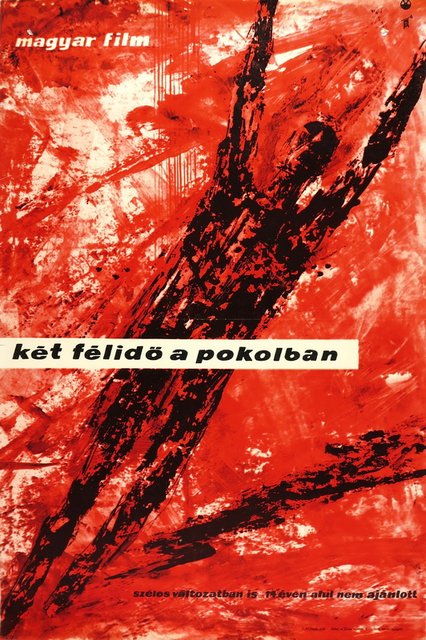
Watchlist Count : 429 (-21)
Next : Le Grand Amour (1969)
Next : Le Grand Amour (1969)
Thank you very much to whomever inspired me to watch Two Half-Times in Hell, and SpelingError, who found it for me.
X
Favorite Movies
X
User Lists
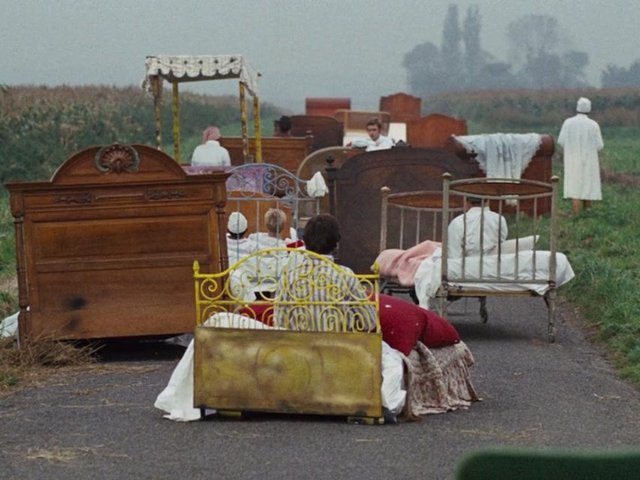
LE GRAND AMOUR (1969)
Directed by : Pierre Étaix
I have to admit to having been charmed by Le Grand Amour even before finally watching it - since I was familiar with it's famous scene of director/star Pierre Étaix (as Pierre) and his compatriots driving down rural French roads in their pajamas, using their beds as cars. It's one of the more famous moments in French cinema - a fantasy born of new love, as this married yet stifled middle aged man falls in love with his young secretary. Le Grand Amour plays around a lot with fantasy, memory and recollection - running through scenes a second, third or fourth time as circumstances change or someone changes their mind. I found it brilliantly funny - an impossible mix of sardonic humour and good natured fooling around, with the ridiculous often being played in a very straight manner. For example, we find out Pierre and his wife Florence (Annie Fratellini) are living with the latter's parents when Florence gets a call from her mother, and Pierre calmly but very deliberately walks downstairs, into the mother's room, and hangs up the phone. It's so matter of fact, as are many moments in this absurdist story of contemplated infidelity. Étaix is often waiting just around the corner though, to surprise us with something visually clever - it's the execution which seems effortless and droll.
I'd say a lot of what we see in Le Grand Amour is way ahead of it's time. It plays with the absurd without being absurdist - for example when Pierre (in his narration) contemplates all of the ladies he could have married, and then we see him marrying all of them at the same time. It makes perfect sense, it's just shown to us in a very silly and audacious manner. It's not only Pierre that gets into this act - when the old ladies who know him spot Pierre exchanging a nod with a young lady, their gossipy whispering to each other reinterprets the situation over and over until the final version of the story has Pierre and the young lady hop behind a bush for some quick lovemaking. Each change to the story we get to visualize, with every addition a funny twist on the one that came before. The narration is a lot of fun as well, with Pierre lamenting seemingly good fortune and being at odds with what we're seeing as real. I often found myself having a good laugh - and that goes double for every time Alain Janey (as Jacques) is giving Pierre his special brand of advice, and we see how that advice might go with a scene where Janey is now playing the role of Pierre.
There's something about Le Grand Amour that just made me feel really good, and if I might perhaps use the word "charming" in relation to this film or that too often, I'm forced to bring the term out again here, for that is surely the best word to describe it. In the wrong hands, a story about a middle-aged man yearning for the love of his very young secretary might have been a little iffy - but here there's no doubt that Étaix sees this situation as it really is. He has a great time fooling around with the men in this film - they are the ones who are the clowns in Le Grand Amour. I'm sure this film provided much inspiration for comedies which were to follow - and at 87-minutes in length it never gets to outstay it's welcome. I surely have more Pierre Étaix films to catch up with - sounds like his career had a sad and controversial ending, but there are three others that look like must-sees. One interesting fact though - Étaix featured in the unreleased Jerry Lewis movie The Day the Clown Cried, which is one hell of a thing to have on your resume. Anyway, I thought Le Grand Amour was terrific and exceedingly funny. There's so much more to see here than just that famous 'beds as cars' scene.
Glad to catch this one - nominated for the Palme d'Or at the 1969 Cannes Film Festival, and part of the Criterion Collection's Pierre Étaix set, Criterion #655.
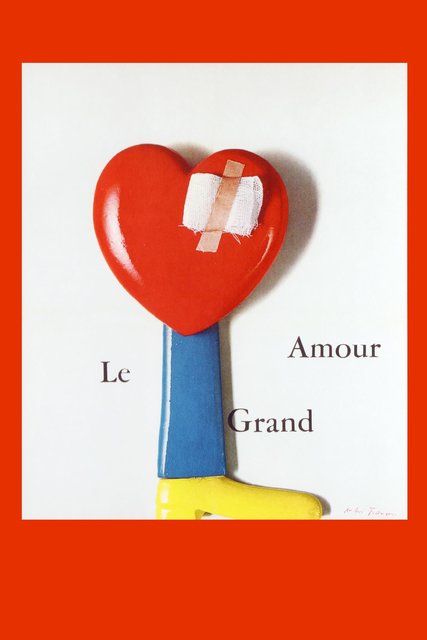
Watchlist Count : 429 (-21)
Next : All About Evil (2010)
Next : All About Evil (2010)
Thank you very much to whomever inspired me to watch Le Grand Amour.
X
Favorite Movies
X
User Lists
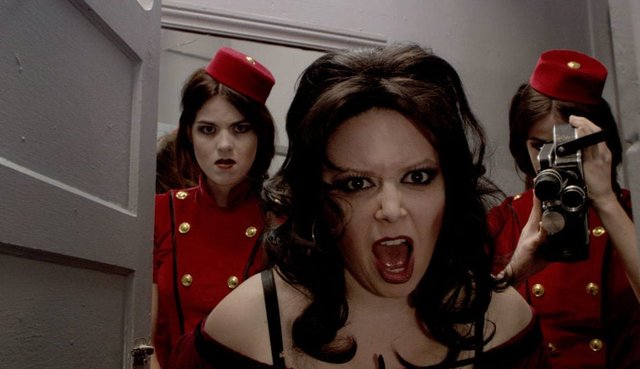
ALL ABOUT EVIL (2010)
Directed by : Joshua Grannell
I haven't crossed paths with as much cheese as I used to see lately, though I'm fond of John Waters films, and All About Evil kind of resembles what a John Waters film would have been like if he'd been a horror filmmaker. This isn't John Waters though - this is Joshua Grannell, otherwise known as Peaches Christ, an underground drag performer who has somehow added horror filmmaking to his resume. We're hovering around Greasy Strangler levels of goofiness, although not quite at that level - and that often offsets how disturbing gory horror can be. When it's a little silly, it's not as disturbing because you're not fully buying into the reality of any situation. It does feel like it's paying tribute to the gorefests of old that nevertheless weren't good enough to cater to more than a niche audience (directly referencing the likes of Herschell Gordon Lewis film Blood Feast), mixing a little high-impact gore in with the camp performances and crazy narrative. We get the likes of Cassandra Peterson (who was once Elvira) and Mink Stole (John Waters regular) to add cult status to the roster of performers - most of whom are younger talent.
So, the movie is about Deborah Tennis (Natasha Lyonne), who runs the Victoria Theatre, an ailing establishment left to her by her late father. It means everything to her, as does screening late-night horror movies for her sparse audience. Her cruel mother wants to sell the place, and during a confrontation Deborah kills her with a pen, making a ghastly scene which is recorded by CCTV, and then accidentally played back to an audience waiting to see Blood Feast. Thinking it's a short film promoting the theatre, they love it - spurring Deborah on to make more "horror shorts" using real victims, and real murders. Fan Steven Thompson (Thomas Dekker) is at first a big supporter, but when his date goes missing and he comes under suspicion, he begins to put the pieces together. In the meantime, along with her old projectionist Mr. Twigs (Jack Donner), Deborah builds on her success by recruiting the psychotic Worthington twins (Jade and Nikita Ramsey) along with a dirty street urchin. Will she be stopped before performing her greatest work yet, a Jonestown-like massacre of her entire fanbase? Will the pile of rotting corpses (along with the victims still dying) in the attic finally draw enough attention to impede her plans?
Throw in Patrick Bristow as a television interviewer, and that's what you've got. A reasonably fun time that almost feels like a light-hearted look at horror as a changing genre. What becomes important to Deborah's fans is how real and explicit the violence is, and what's important to Steven is the genre itself, and the fact that Deborah is that rarest of breed - a female horror director. To Deborah's projectionist it's just the fact that the show is going on, and movies are being made and enjoyed. Horror has to adapt to suit cultural mores, break taboos, and get a group of people to share an intense experience - all of it taken in the spirit intended. To Deborah though, it's an outlet to repay years of being looked down upon, name-calling, financial distress and neglect. She probably thinks the audience shares her grievances. This offbeat look at horror is a horror film itself - and while the inward gaze is most often simply goofy and trying to be funny, sometimes a film can say just as much while still lacking the gravitas. A real mixed bag, but there's enough here to warrant a "check out All About Evil" to lovers of cheesy, goofy horror comedies.
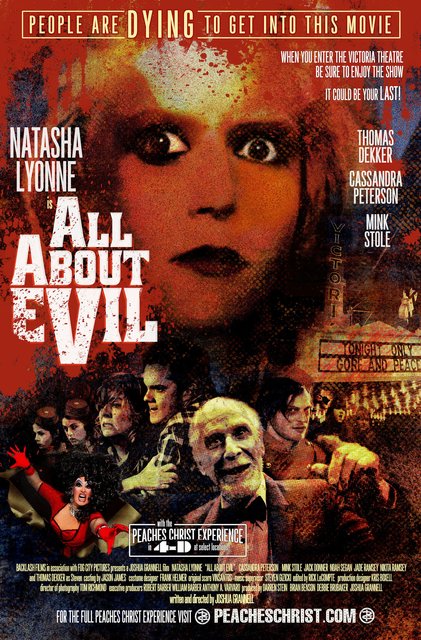
Watchlist Count : 431 (-19)
Next : Aferim! (2015)
Next : Aferim! (2015)
Thank you very much to whomever inspired me to watch All About Evil.
X
Favorite Movies
X
User Lists
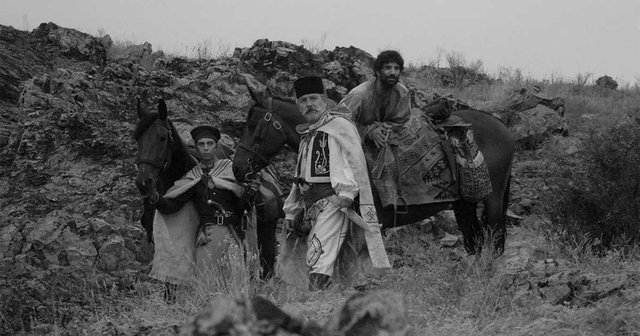
AFERIM! (2015)
Directed by : Radu Jude
Ouch! This story sure has a sting in it's tail - you never know what you're going to get when you descend into a faraway land from quite a time long ago, and here we're in early 19th Century Wallachia, Romania, following what can be loosely termed as a "policeman" and his son as they hunt down an escaped slave. Costandin (Teodor Corban) is a rough, ungentlemanly fellow who delights in thinking up as many insults possible for whomever he's talking to, but his manner is befitting the filthy, superstitious rabble he's often confronting. His son, Ionita (Mihai Comanoiu) has a more gentle nature - which is something he's working hard at grinding away, for life in Wallachia during the early 1800s is hard, and grim. The dark-skinned slaves in the area are known as "crows", and have short, brutal lives which amount to nothing but laborious servitude, hunger, pain and weariness. The slave Costandin is looking for, Carfin (Toma Cuzin) has been accused of stealing from his boss, Boyar Iordache Cîndescu (Alexandru Dabija) - but the truth is that the Boyar's wife seduced him. Carfin strongly suspects that the Boyar will kill him if he's returned.
The most enlightening moment of Costandin's trip for me is when he and his son encounter a priest on the road, and they take a moment to "educate" themselves by asking him questions - it seems a priest is thought of as all-knowing. He asks if crows are actually human beings, and I was gladly thinking the priest was enlightened when he confirmed that they are God's children and human. But unfortunately, in his very next breath, the priest informed Costandin that Jews aren't human before launching into a diatribe explaining why. This priests knowledge, in the end, consists of various superstitions, garbled nonsense and falsehoods which Costandin and his son accept as greater wisdom. All that aside however, deep down this bounty hunter-type fellow and his son both have a sense of what is morally right and wrong, which we see naturally stirring when they inevitably have to spend time with their quarry. Despite all of the prejudice, and the way this slave has been cast into the lowest rungs of society, when forced into close proximity with Costandin there's little malice. Obviously Ionita is the way he is because he has a free-thinking father.
Radu Jude has done a great job here taking us back in time - while watching Aferim! my suspension of disbelief came very easily. The costumes overall were fantastic, and there was a lived in feeling to every ramshackle village, hut, or stone house - everything filthy and at times disease-ridden. I liked how the Boyar's place wasn't magnificent opulence but messy, dirty and fly-ridden comparative wealth. The Boyar's hat (an işlic) was really something else (and from what I read, the type proves that he was from a lower, third rank of nobility.) The black and white photography is superb, and very expansive while favoring the social structure by giving precedence to the characters with a better standing. Overall this was an exceptional film that brings us an extraordinarily authentic look at a time when life truly could be defined as a constant struggle, where morals existed but had no bearing on how day to day decisions were made. Harsh and unrelenting, but interesting as a comparison to ourselves, and the world we've since made.
Glad to catch this one - it won the Silver Bear for Best Director at the 65th Berlin International Film Festival, and was the Romanian entry for the Best Foreign Language Film at the 88th Academy Awards.
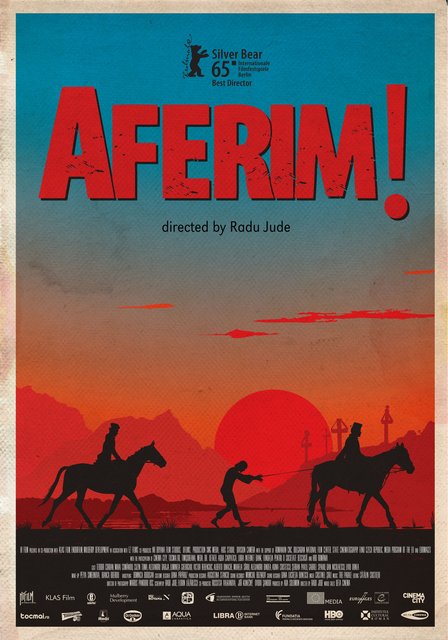
Watchlist Count : 431 (-19)
Next : The Novice (2021)
Next : The Novice (2021)
Thank you very much to whomever inspired me to watch Aferim!.
X
Favorite Movies
X
User Lists
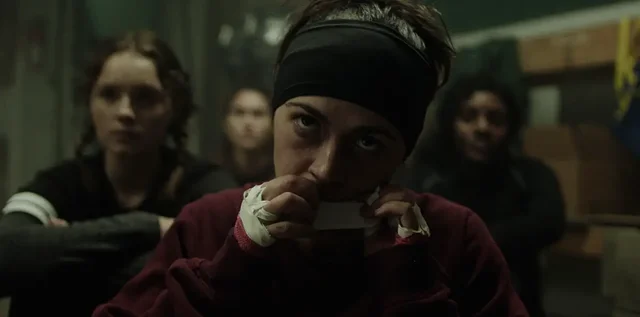
THE NOVICE (2021)
Directed by : Lauren Hadaway
Sometimes it's fun to see films inspire other films - as if the cinematic landscape is a brush fire, and ideas travel by one ember setting the next branch alight. Through most of The Novice, you'll be forced to think of Whiplash - which is no bad thing, especially since this film has enough of it's own identity and originality to be seen as one that has been inspired, and not copied. Instead of drumsticks, Alex Dall (Isabelle Fuhrman) has in her hands a pair of oars as she works herself into the Wellington College Novice Rowing Program. Dall is obsessively competitive by nature, and a compulsive perfectionist - needing desperately to achieve higher grades, and do more than those around her. Starting as a Novice, she puts so much effort into trying out and practicing that she vomits, wets herself, has dizzy spells and basically takes her body to the absolute limit. This, and the extra time she puts in, helps to elevate herself suddenly to the Varsity team where she's knocking elbows with seasoned pros, battle-hardened old-timers and experienced winners. Whenever she makes a mistake, she punishes herself and her intensity makes it hard for her to win friends, bond with her team-mates and be seen in a positive light. A destructive cycle has started.
A big difference between this film and Whiplash is that while there's much blood, sweat and tears (much of all three in a very literal sense) there's no maniacal coach or teacher pushing Dall beyond her limits. Instead, it's her own pathological disorders, neurosis and obsessive need that puts her in harm's way. We see early on that she's a cutter - so we know that all isn't well on the psychological front, and can draw a straight line connecting her academic tenacity to the way she pushes herself to become a great rower nearly overnight. In the meantime she meets Dani (Dilone), and the two begin an intimate relationship. The way we experience Dall's dizziness, blackouts, exhaustion and sense of motion comes to us through innovative use of sound, cinematography and editing - something that I thought the film did particularly well. I loved when Lauren Hadaway would put Dall in an isolated place with nothing surrounding her during practice - nothing but darkness as far as the eye can see. As a bonus, you will learn a lot about rowing, and what it takes to train to become a competitor in this gruelling sport.
I loved, loved, loved The Novice - you never know just how dark everything is going to get, and as the light fades and Dall digs herself further into a metaphorical pit you can feel the tension rising. You can tell that this isn't an inspirational sports movie, it's a movie about how unhealthy obsession is - and especially how lonely. It's a movie about how some people feel the need to achieve just to be accepted, or at least to feel as if they'll be accepted. It's a movie about how unhealthy it is not to listen to what people are saying, and taking good advice. Isabelle Fuhrman steps away from her childhood role in The Orphan here, and makes a statement as an actress capable of intensity on a variety of different levels, while still showing the vulnerability needed for this very specific role. I felt her pain every step of the way in The Novice - especially as she realized more and more that her fellow rowers all passionately hated her because she only obsessively focused on herself, and whenever she did catch glimpses of them, it was as rivals. The same drive that helps us to accomplish can also completely destroy us.
Glad to catch this one - it won the Best Actress award, Best Feature and Best Cinematography at the 2021 Tribeca Film Festival.
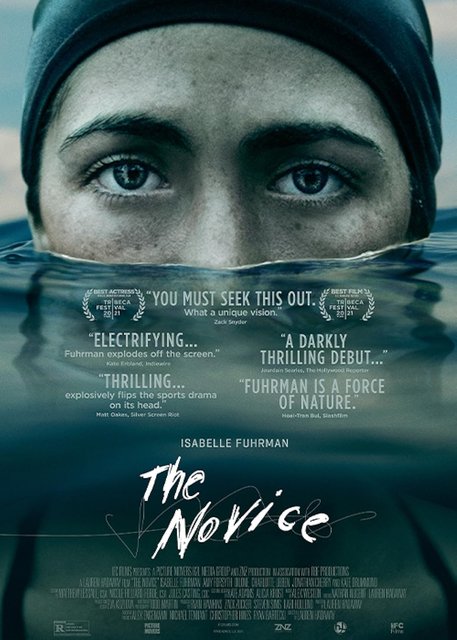
Watchlist Count : 433 (-17)
Next : La Terra Trema (1948)
Next : La Terra Trema (1948)
Thank you very much to whomever inspired me to watch The Novice.
X
Favorite Movies
X